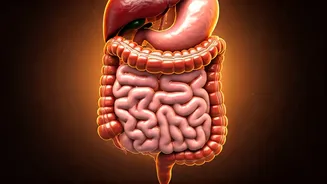Embrace a Healthy Diet
One of the cornerstones of managing cholesterol levels lies in making conscious food choices. This involves prioritizing a diet rich in soluble fiber,
which can actively bind to cholesterol in the digestive system, preventing its absorption. Incorporate foods like oats, barley, apples, and beans into your meals. Additionally, the consumption of plant sterols and stanols, found in fortified foods, can assist in blocking cholesterol absorption. It's also vital to limit the intake of saturated and trans fats, abundant in processed foods and certain animal products, as they contribute significantly to elevated cholesterol. Instead, increase your intake of unsaturated fats, such as those found in olive oil, avocados, and nuts, which are heart-healthy options. By focusing on whole, unprocessed foods and making these mindful dietary adjustments, you can positively impact your cholesterol levels and improve overall heart health.
Exercise Regularly & Often
Physical activity plays a crucial role in lowering LDL (bad) cholesterol and increasing HDL (good) cholesterol levels. Aim for at least 150 minutes of moderate-intensity exercise per week, which could include brisk walking, cycling, or swimming. These activities not only improve cholesterol profiles but also contribute to weight management, blood pressure control, and overall cardiovascular health. Incorporate exercises you enjoy to make it sustainable. Consider incorporating strength training exercises, which further benefit cholesterol levels and enhance metabolic health. Finding time for regular exercise can significantly reduce the risk of heart disease, as regular physical activity is directly linked to better heart health and an improved quality of life. Even small amounts of activity, such as taking the stairs or walking during lunch breaks, can contribute to your overall goal.
Lose Excess Weight
Losing even a small amount of weight can positively impact your cholesterol levels. Excess weight is often linked to higher levels of LDL cholesterol and lower levels of HDL cholesterol. When you lose weight, your body becomes more efficient at processing cholesterol, and the balance shifts in favor of healthier levels. This improvement in cholesterol profile lowers the risk of heart disease. Weight loss also improves other heart-health markers, such as blood pressure and blood sugar control. To achieve this, combine a balanced diet with regular physical activity. Gradual and sustainable weight loss through lifestyle changes is more beneficial for long-term health than drastic, unsustainable measures. Consult with a healthcare professional to determine a healthy weight range and create a weight loss plan tailored to your needs.
Quit Smoking
Smoking is a significant risk factor for high cholesterol and heart disease. It damages blood vessels and reduces HDL cholesterol levels, which are critical for removing harmful cholesterol from the arteries. Quitting smoking can quickly lead to improvements in cholesterol profiles. Within weeks of quitting, HDL cholesterol levels often begin to rise, and the risk of heart disease significantly decreases. Quitting smoking also improves overall health, leading to better circulation, lower blood pressure, and improved lung function. Resources such as support groups, counseling, and nicotine replacement therapy can assist in the process. Embrace the benefits of a smoke-free lifestyle, and experience the positive changes in cholesterol levels and overall heart health, making a considerable investment in your future.
Limit Alcohol Consumption
Excessive alcohol consumption can lead to increased cholesterol levels and elevate blood pressure. Moderate alcohol consumption, however, has been shown to have different effects. In some studies, moderate alcohol consumption (one drink per day for women, and up to two drinks per day for men) may raise HDL cholesterol. Nevertheless, the benefits are not uniform, and the potential risks often outweigh the advantages. Therefore, it is essential to focus on moderation. Overindulging can harm the liver, and increase the risk of heart disease. If you drink alcohol, do so in moderation, and be mindful of your overall health. Consider the effects of alcohol on your cholesterol levels, and make responsible choices to keep your heart healthy.
Manage Stress Levels
Chronic stress can influence cholesterol levels and heart health negatively. When stressed, the body produces hormones that can raise cholesterol levels and increase the risk of heart disease. Finding healthy ways to manage stress is therefore critical. Techniques like meditation, yoga, deep breathing exercises, and spending time in nature can effectively reduce stress. Incorporate stress-reduction practices into your daily life to cultivate calmness. Exercise is another excellent way to manage stress, as it releases endorphins that have mood-boosting effects. Ensure adequate sleep, as sleep deprivation can worsen stress. By managing stress effectively, you can positively affect your cholesterol levels, improve your overall mental well-being, and lower the risk of heart disease. Be mindful of your stress levels, and take proactive steps to maintain balance in your life.
Eat More Fiber
A diet rich in soluble fiber can significantly help to lower LDL cholesterol levels. Soluble fiber, found in foods like oats, beans, apples, and citrus fruits, binds with cholesterol in the digestive system, preventing its absorption into the bloodstream. Increasing your fiber intake is a simple but effective strategy for managing cholesterol. Make sure to choose whole grains over refined ones. Include beans, lentils, and other legumes in your meals regularly. Add fruits and vegetables, especially those with edible skins, to your diet. The recommended daily intake of fiber is about 25–30 grams. Increasing fiber intake can improve cholesterol levels and provide several other health benefits, including better digestion and weight management. It contributes to overall health and reduces the risk of heart disease. Make fiber-rich foods a regular part of your meals.
Eat Healthy Fats
Not all fats are created equal; opting for healthy fats over saturated and trans fats is a smart choice for managing cholesterol levels. Unsaturated fats, such as those found in olive oil, avocados, nuts, and fatty fish (like salmon), can help reduce LDL cholesterol. Avoid foods high in saturated fats (like red meat and processed foods) and trans fats (found in many processed foods and fried items). Instead, incorporate sources of healthy fats into your diet. Cooking with olive oil or using it in salad dressings is a great way to increase healthy fat intake. Add avocados to sandwiches or salads. Consume nuts and seeds as snacks or additions to meals. By focusing on healthy fats, you can lower your LDL cholesterol and support heart health. Replace unhealthy fats in your diet with healthier alternatives for optimal health benefits.
Consider Plant Sterols
Plant sterols and stanols are compounds that can actively block the absorption of cholesterol in the digestive system. They are found naturally in small amounts in plants, but are often added to fortified foods like yogurt, orange juice, and margarine. Including plant sterols in your diet can reduce LDL cholesterol levels. Consume foods fortified with plant sterols as part of a balanced diet. Read food labels carefully to find products containing these beneficial compounds. The recommended daily intake of plant sterols is approximately 2 grams. Plant sterols can contribute to your heart health as part of an overall cholesterol-lowering strategy. Consider plant sterol supplements, but discuss this with your doctor first. Incorporate them into your routine to boost your heart health naturally.



















